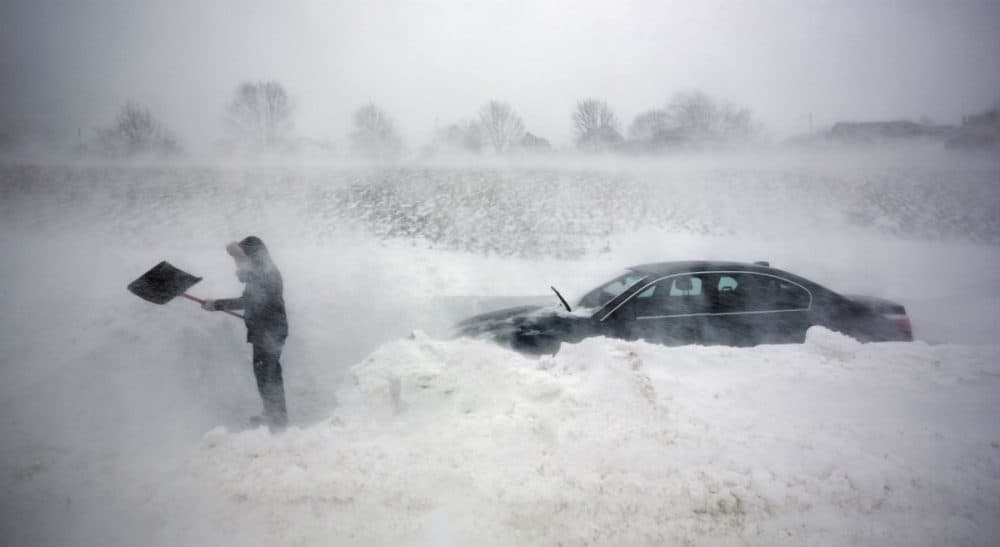Advertisement
Snowed In The Suburbs: Some Thoughts On Curbing Our Dependence On Cars

Growing up in suburban New Jersey, I used to look forward to winter. Especially those extraordinary days that began with the sonorous, spine-rattling sound of my hometown’s school-cancelling siren. Energized by the prospect of the snow day ahead, I’d join my brothers or friends in the neighborhood to build forts and snowmen in front yards or sled down pristine hillsides. All while marveling at the look and feel of a gray, barren landscape suddenly gone white.
During this winter’s spate of major snowstorms, however, I’ve chafed at the first mention of an upcoming blizzard or other “plowable event.” Now snow days mean long hours clearing the white stuff off the driveway, cars, sidewalks, steps and rooftops. Not just once in a while, but once a week or more. Child’s play for an avid outdoorsman, but a bit daunting for a 50-something commuter who spends most business days sitting on his duff behind workstation and windshield.
Thoreau once wrote, 'We do not ride on the railroad; it rides upon us.' If he were alive today, he might have extended the line to apply to asphalt roads as well.
While recovering in a recliner after one shoveling marathon, it struck me that I and millions of other suburban dwellers in Greater Boston — along with legions of plow operators — had toiled for hours in the service of the motorized vehicles upon which most of us had come to depend for life, liberty and the pursuit of happiness. Indeed, without this collective sacrifice to the automotive gods, most of my neighbors would be hard pressed to get to work, the grocery store, the doctor’s office and other life-support systems not easily reachable by public transit, bicycle or foot.
Thoreau once wrote, “We do not ride on the railroad; it rides upon us.” If he were alive today, he might have extended the line to apply to asphalt roads as well. Whether our transportation of choice is the train, automobile or bicycle, we are inconvenienced if not immobilized every time a critical mass of snow is dumped on the thousands of miles of high-maintenance roads that form the skeleton of Greater Boston and other metro areas.
So how can we begin to reverse the curse of road-dependency in suburbia, and the snow removal headaches that go with it? How might we bring more of the goods and services we need to survive and thrive within walking distance so we won’t always have to clear our driveways to reach them?
Curbing our addiction to life on the road may seem like a radical proposition, but citizens of Massachusetts are already taking steps that could help move us in that direction. These include:
Mix it up. Smart growth policies in a number of Massachusetts cities and towns promote the development of walkable, mixed-use neighborhoods that integrate open space, housing, business offices, shops, municipal buildings and other venues. For instance, in 1988 a strip mall in Mashpee in Cape Cod was converted into Mashpee Commons, a mixed-use, mixed-income, town center where residents attend to many of their needs on foot. Caveat: these policies can take years to implement.
Live off the land. Likeminded neighbors can reconfigure their block into an ecovillage — a walkable, environmentally-friendly, intentional community where residents strive to produce and access as much of life’s essentials as they can on the premises. Since its founding in 1978 in Shutesbury, Sirius community, the northeast’s longest-standing ecovillage, has made great strides in bringing the production of food, energy and housing back home. However, some residents commute to jobs outside the property, so there’s still a need to dig out.
Go virtual. In mid-February, Eric Convey, web editor of the Boston Business Journal, made a compelling case for an off-road activity that puts the workplace literally at our fingertips: telecommuting. But while telecommuting has returned some workers to the home front in recent years, their ranks are extremely thin. According to Global Workplace Analytics, a mere 2.6 percent of American employees consider the home their primary place of work. Could the winter of 2015 be the spark of a telecommuting revolution?
Curbing our addiction to life on the road may seem like a radical proposition, but citizens of Massachusetts are already taking steps that could help move us in that direction.
Apply heat. If all else fails, we can always resort to the good old American techno-fix: retrofit roadways with radiant heating that melts snowflakes on contact. The Veron Company in Marlborough offers energy-efficient, low-maintenance radiant heating systems for driveways, walkways, roofs, gutters and downspouts. Innovative, yes; cheap, no. According to Angie’s List, installation costs for a 20-by-50-foot driveway can run more than $15,000.
While clearing the first big snows, I considered other, simpler ways to dodge the driveway dig. Should I move closer to public transit? Become an instant bicycle enthusiast? Hire a snow removal service? But by the fourth storm, it occurred to me that the least stressful way forward might be to simply adapt to the new normal of frequent major plowable events.
For now, I choose to adapt. In fact, I already have. Having cleared 100 inches of snow since the start of the winter, I figure my snow-hardened body is primed to handle whatever comes its way. The next time it snows enough for a school-canceling text to appear on my cell phone, I plan on welcoming the onslaught.
A three-foot blizzard? No biggie. Freezing rain on top of that? Bring it on! Before you know it, I’ll be so good at this that I’ll even have energy left over to join my 10-year-old building snowmen, sleighing down hills and marveling at the sheer beauty of it all.
